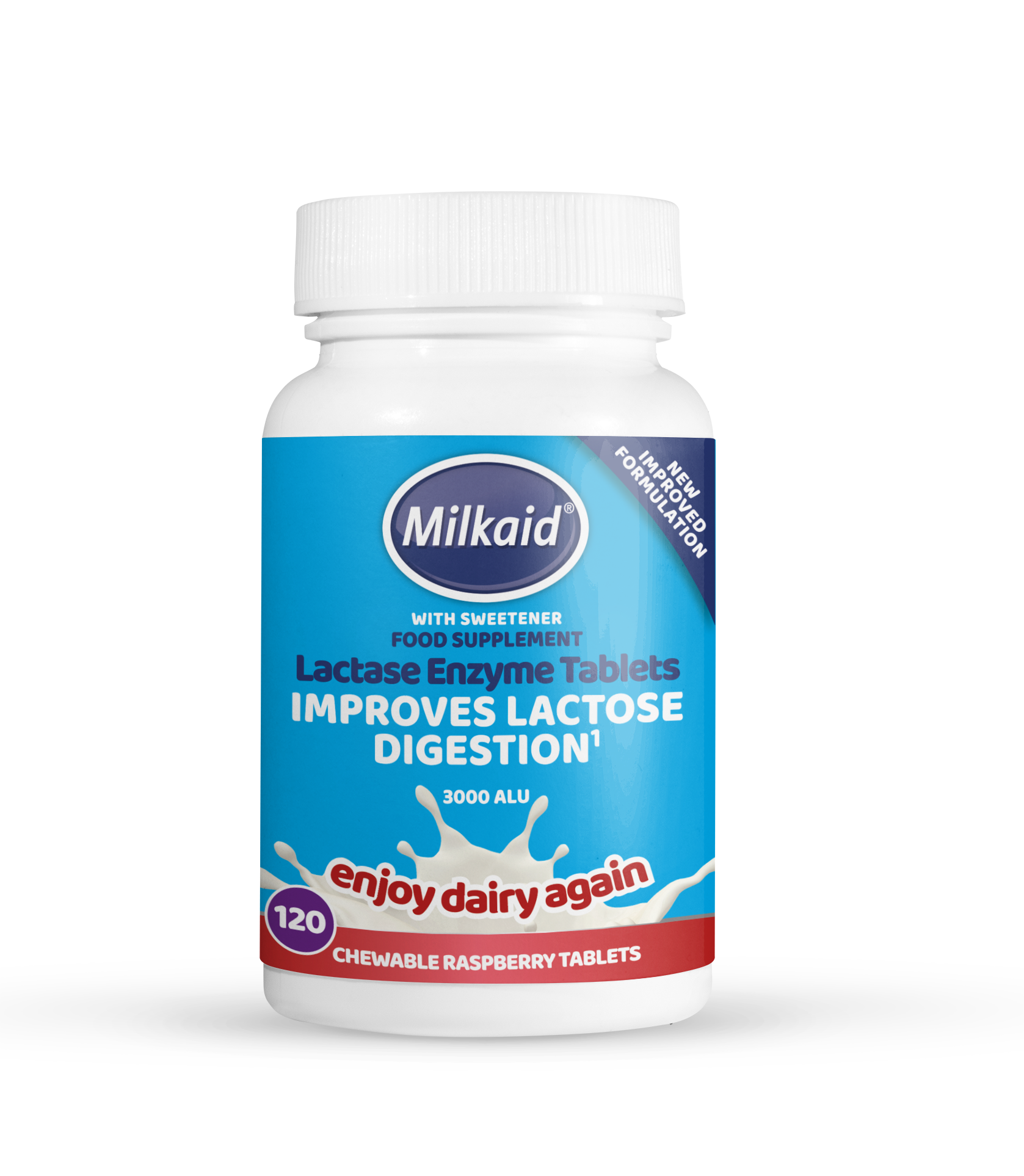Advices For Adults
Milkaid has worked with registered nutrition consultant, Jenna Hope, to provide a range of nutritional advice for those who have or suspect they may have an intolerance to lactose. This is via a series of articles, Q&A’s and recipes. As well as being a registered nutrition consultant, Jenna has a passion about making nutrition smarter, clearer and simpler for all.
Jenna looks to provide quick, easy, nutrition advice which can be implemented easily every day. It is her mission to educate as many people as she can on the smart ways nutrition can change your life. She has a first-class undergraduate degree and a masters degree from The University of Surrey, and has featured regularly in media outlets such as This Morning, Sky News, Harper’s Bazaar, Cosmopolitan, Red magazine and more.
This range of articles includes information on Soothing Your Stomach, The Importance of Dairy, Living
with Lactose Intolerance and Cutting through the Jargon.
Living With a Lactose Intolerance
Lactose intolerance is not uncommon and should you be diagnosed, you needn’t feel alone. Managing your lactose intolerance does not have to take over your life, it should not cause stress or anxiety and it should definitely not affect your social life. Being equipped...
Cutting Through the Jargon
In today’s society when it comes to nutrition, there’s always the next trend or a scaremongering headline. This information can often seem confusing, scary and outright bewildering. In this article, you’ll learn about what lactose intolerance is, how to recognise the...
The Importance of Dairy
It’s commonly understood that dairy is a particularly important component of the diet in childhood due to its calcium content. Although, as individuals age it appears that the emphasis on the importance of dairy is often reduced over time. Whilst calcium is vital for...
Soothing Your Stomach
Lactose intolerance is a common condition although symptoms can vary between individuals and can be affected according to tolerance levels and gut bacteria. Some of the most common symptoms include diarrhoea, bloating, flatulence, stomach pain and constipation. It’s...
FAQ’s
What is lactose intolerance?
Lactose intolerance is the inability of the body to fully digest lactose. Lactose is a type of sugar which is found naturally in milk and some other dairy products including: yoghurt, cheese, cream and small amounts in butter. Lactose can also be found in some pre-made products such as cakes, pancake mixes, breads and pastries as well as appearing in some medications. Medications alone are unlikely to trigger symptoms although they can contribute to your tolerance levels of lactose. In order to digest lactose an enzyme called lactase is required. Individuals who are lactose intolerant lack the lactase enzyme naturally in their body. As a result, the milk sugar, lactose is not digested properly (maldigested) which can give rise to the symptoms of lactose intolerance. Lactose intolerance is generally harmless, although it can cause people some discomfort and embarrassment.
Why does milk cause lactose intolerance?
Milk is a primary source of lactose, a sugar found naturally in milk and dairy products. Lactose is the initiator of the symptoms of lactose intolerance. Individuals who do not naturally have enough lactase will not be able to digest lactose effectively as they cannot break it down efficiently in their body.
What does lactose intolerance look like?
Lactose intolerance vary between individuals although below is a list of the most common signs that a person may not be able to digest lactose fully. Please note that just because you recognise these signs, it doesn’t necessarily mean you are lactose intolerant. These signs are common of many other gut disorders and therefore it’s recommended that you seek help from your GP to identify the problem.
These effects are typically bought on within a few hours of consuming more lactose than your body can handle. For some individuals this may be the equivalent of a few tablespoons of milk whereas for others their tolerance may be higher.
Common signs include:
Nausea
Vomiting
Severe bloating
Gastrointestinal cramps
Flatulence
Diarrhoea
If you think you may be lactose intolerant, it’s recommended that you seek a professional diagnosis from your GP rather than self-diagnosing. Lactose intolerance can be managed through making changes in your diet and the use of Milkaid. Milkaid is a food supplement which provides the lactase enzyme to help breakdown and aid digestion of lactose.
Why and how does lactose intolerance develop?
Lactose intolerance can also develop at any stage of the lifecycle. Lactose intolerance can be a hereditary condition which you may suffer from birth (this is rarer). Alternatively, primary lactose intolerance is hereditary although isn’t usually symptomatic until early adulthood.
Secondary lactose intolerance is when the individual becomes lactose intolerant as a result of a condition such as Crohn’s Disease or another form of Inflammatory Bowel Disease (Note: this is different to the more commonly experienced Irritable Bowel Syndrome).
The difficulty to digest lactose becomes more common as individuals age as the small intestines reduce the production of lactase.
Is taking a lactase supplement safe?
Yes, the lactase in Milkaid is extracted from natural yeasts and is generally regarded as safe. We do recommend pregnant women seek personalised advice from their GP. Evidence shows that consumption of lactase enzymes can breakdown lactose in individuals with known lactose intolerance, to avoid maldigestion of lactose. NHS choices recommend the use of a lactase enzyme supplement for individuals who cannot breakdown lactose naturally.
Should I be having lactose free milk?
Lactose free milk is the same milk you buy in the shop but with the added lactase enzyme to help breakdown the naturally occurring milk sugar, lactose. This milk still contains lactose and is equivalent of taking a Milkaid supplement before consuming it. Some consumers prefer to choose to have dairy and having the option to supplement with Milkaid tablets or drops gives them this freedom.
Is Milkaid suitable for children?
Yes, if your child has been diagnosed with lactose intolerance. The production of lactase will slow down after the age of 2 in children with lactose intolerance. It is not recommended to give Milkaid to your child before diagnosis. Milkaid is available in drops and strawberry flavoured chewable tablets suitable for three years upwards. For small children, from one year upwards, Milkaid Drops offer an alternative format, where chewing larger tablets may present a choking hazard.
Can I eat foods containing lactose?
Yes, if you have been diagnosed with lactose intolerance and you consume Milkaid Drops or Milkaid Tablets before consuming lactose containing food then you will able to eat dairy products. Milkaid is convenient for carrying around, travelling and taking discreetly. Please be aware taking more than 64 drops in a 24-hour period or 6 raspberry chewable tablets per meal is not advised.
How will taking Milkaid help me feel?
Milkaid is not a medicine. Milkaid is a food supplement that contains lactase enzyme. Evidence shows that consumption of lactase enzymes can breakdown lactose in individuals with known lactose intolerance, to avoid maldigestion of lactose. Consumption of a lactase enzyme supplement is recommended for individuals who cannot breakdown lactose naturally. Consuming Milkaid with or before a food containing dairy can help to the reduce/ inhibit your symptoms. Choosing to supplement your diet with Milkaid Tablets or Milkaid Drops means that you can enjoy dairy products knowing that you will be able to breakdown the lactose in the food and not experience any unwanted effects from lactose intolerance.
How will I know if I have lactose intolerance?
If you think you may have lactose intolerance due to experiencing any of the listed symptoms following the ingestion of dairy product, then you should seek a diagnosis from your GP. Symptoms listed above can be a sign of other gut health related complications and therefore a professional examination is essential.
How do I get tested for lactose intolerance?
Seek advice from your GP. Your GP may prescribe a lactose free diet initially to see if your symptoms subside. Alternatively, they may conduct a hydrogen breath test or a blood test to identify whether you’re lactose intolerant.






